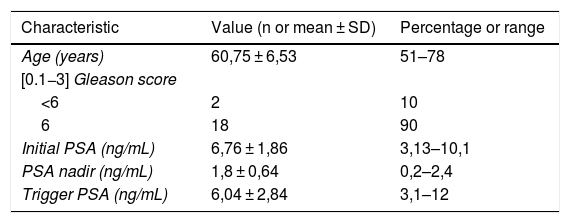The objective of the study was to evaluate the usefulness of 18F-choline PET/CT in biochemically recurrent prostate cancer patients treated with brachytherapy, as well as to assess the changes in therapeutic management derived from its outcome.
Material and methodsRetrospective study of 20 patients between 51 and 78 years old, with a history of prostate adenocarcinoma that had been treated with brachytherapy and presented biochemical recurrence (PSA 3.1−12 ng/mL) and staging tests (CT and bone scan) without alterations, were included. The findings visualized in the PET/CT scan with 18F-choline were correlated with the histopathology and/or the evolution of the PSA after therapy.
Results18F-choline PET/CT scan only detected local recurrence in 15 patients. Local and regional recurrences were seen in 4 patients, and 1 patient presented local and bone recurrence. Local recurrence detected in PET was confirmed by anatomopathological studies in 85% of the cases. In one patient, these findings (PET scan) turned out to be prostatitis, and it could not be confirmed in another patient. Of the cases with local and regional recurrence, local recurrence was histologically confirmed in 3 out of 4 patients.
18F-choline PET/CT changed the therapeutic management in 25% of the patients, discarding the initially planned salvage surgery in 3 cases, 1 radiotherapy and 1 brachytherapy.
Conclusion18F-choline PET/CT could be a useful technique in the group of patients with biochemical recurrence after brachytherapy, providing locoregional and distant involvement findings which had not been detected with conventional imaging tests, thus determining a more adequate therapeutic management.
El objetivo del trabajo fue valorar la utilidad de la PET/TC con 18F- colina en pacientes con cáncer de próstata tratados con braquiterapia en recidiva bioquímica, así como valorar los cambios en el manejo terapéutico derivados de su resultado.
Material y métodosEstudio retrospectivo en el que se incluyeron 20 pacientes entre 51 y 78 años, con antecedente de adenocarcinoma de próstata que habían sido tratados con braquiterapia, que presentaban recidiva bioquímica (PSA 3,1-12 ng/mL) y estudio de extensión (TC y gammagrafía ósea) sin alteraciones. Los hallazgos visualizados en la PET/TC con 18F-colina fueron correlacionados con la histopatología y/o la evolución del PSA tras la terapia.
ResultadosEn 15 pacientes la PET/TC con 18F- colina detectó únicamente recidiva local. En 4 pacientes recidiva local y linfática y en 1 paciente afectación local y ósea. La recidiva local detectada en PET se confirmó anatomopatológicamente en el 85 % de los casos. En un paciente los hallazgos visualizados en el PET resultó ser una prostatitis y en otro paciente no se pudo confirmar. De los pacientes con recidiva local y linfática, se confirmó histológicamente la recidiva local en 3 de 4 pacientes.
En el 25 % de los pacientes, la PET/TC con 18F-colina cambio el manejo terapéutico, desestimando la cirugía de rescate inicialmente prevista en 3 casos, en 1 radioterapia y en 1 la braquiterapia.
ConclusiónLa PET/TC con 18F-colina podría ser una técnica útil en el grupo de pacientes tratados con braquiterapia con recidiva bioquimica, permitiendo localizar la afectación locorregional y a distancia no detectada con imagenes convencionales, determinando así un manejo terapéutico más adecuado.










